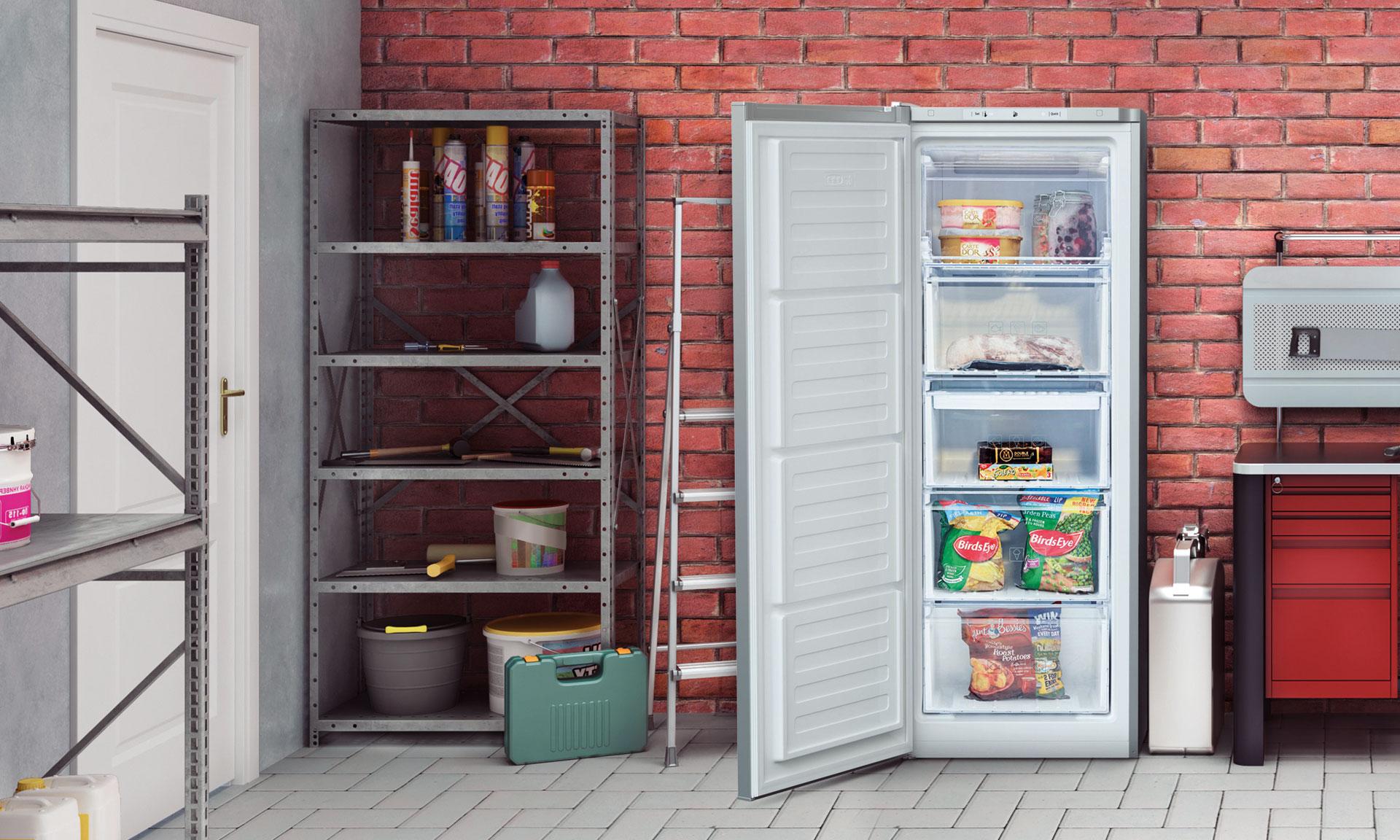Storing a refrigerator in the garage can be a handy way to improve your food storage space. Besides, when working at the garage, you won’t have to waste time going to the main house to grab a drink. But, will a refrigerator work in a garage? Unfortunately, when summer or winter hits, your garage can get extremely hot or cold, causing trouble for your refrigerator. However, there are certain things you can do to keep the refrigerator running even during these seasons. Keep reading!
Can a Refrigerator Work in a Garage?
You can store a refrigerator in the garage; however, consider the temperature inside first. Besides, understanding how modern refrigerators work will help you determine if your setup is suited for a garage refrigerator. Most refrigerators operate by sensing the temperature of the surrounding air and adjusting the temperature within the refrigerator appropriately.
Conversely, fridge freezers operate by regulating the temperature within the freezer and directing cold air from the freezer to the refrigerator. And very high or low temperatures within your garage can disrupt the process. Therefore, before investing in a garage refrigerator, evaluate your local environment.
Will a Fridge Work in a Cold Garage?
Extreme cold temperatures might cause your garage fridge’s thermostat to malfunction. If the temperature in your garage falls below a specific threshold, the thermostat detects the decline and may register that the refrigerator is already cold enough, even though it isn’t. Your refrigerator may shut down when this occurs, causing the food inside to defrost or become excessively warm. Moreover, if the temperature falls below freezing, the food in the refrigerator may freeze.
For your fridge to work perfectly in a cold garage, we recommend buying a heating coil and place over the fridge’s thermostat throughout the winter. Different heating coils are specifically designed to work on fridge and freezer thermostats. You might also put a heater or heat lamp near the thermostat.
What about a Freezer in the Garage During Summer?
If summers in your location are hot, a freezer in the garage will have to work harder to keep the internal temperature cool. Besides, due to the increased moisture, humid weather can cause the fridge and freezer coils to rust. Moreover, increased strain on your refrigerator’s cooling system will reduce its longevity, so take precautions to keep its cooling coils from overheating.
For your freezer to work perfectly during summer, one of the easiest approaches is to direct a fan toward the cooling coils. And if humidity is a concern, a dehumidifier can reduce humidity levels and preserve your fridge and freezer coils from corrosion.
Tips on How to Run a Refrigerator in a Hot Garage
1. Ensure its full stocked
The refrigerator will have to fight against the ambient temperature in a hot garage to keep your foodstuffs cool. Therefore, we recommend stocking it fully to help it out. If you don’t need the entire fridge, consider filling the remaining space with gallons of water. Besides, when the refrigerator door is opened on a hot day, it will stay cool and help the refrigerator retain its temperature.
Conversely, when the door of an empty refrigerator is opened, warm air rushes in, and cold air rushes out. This is because water – or anything else you store in the refrigerator – leaves less space for warm air, allowing the inner air to return to normal temperatures much faster when the door is closed.
2. Take care of perishables.
When your refrigerator is exposed to severe temperatures, there is always the possibility of an operational breakdown. This situation is aggravated because you may not be in your garage often enough to detect a problem right away. Even if you have followed all necessary precautions, reducing the risk by keeping non-perishable things in your garage refrigerator is good. Keep your garage refrigerator for soda, water, beer and pantry items that will not spoil easily, and keep your kitchen refrigerator for ice cream and perishables. This will prevent food waste and the need to clear up a large mess if your garage refrigerator fails.
3. Perform maintenance
Most people may be unaware that simple maintenance may significantly influence refrigerator performance. Cleaning the coils a couple of times a year, for example, can minimize strain on the unit and enhance performance. Coils can accumulate dust, grime, and other debris, especially in areas unlikely to be cleaned regularly, such as a garage. Therefore, keep in mind that you can boost efficiency and better equip your refrigerator for any demanding situations by cleaning the coils.
4. Cool it
For your refrigerator to work in a garage, ensure you cool it. According to GE, refrigerators should only be placed in rooms with a 60 to 110 degrees Fahrenheit temperature range. Due to misuse, the refrigerator will not shut down in warmer weather and risks overheating. If the temperature in your garage consistently surpasses 110 degrees Fahrenheit, it is not a good location for a refrigerator. Consider techniques to keep the temperature down if you want to put a refrigerator in a hot garage.
Cooling can improve through insulation, additional air conditioning, fans, and vents. Also, check any doors and windows for leaks and, if required, install weather stripping to keep as much heat out as possible. Cover windows to keep the sun’s heat at bay.
5. Ensure the refrigerator is always connected to a power source.
Kitchens specifically wired for fridges are guaranteed to have proper hookups while garages aren’t. Therefore, ensure the fridge is equipped with a 115 V, 60 Hz, AC-only power outlet since without the proper type of electrical connection, the refrigerator won’t get adequate power. It may be unable to operate its engine effectively, putting more strain on the condenser and preventing it from producing enough cold air. If you don’t have the right connection or are unsure, get an electrician to install the necessary wiring.
6. Pay attention to the manufacturer’s warning.
Some manufacturer warranties may become invalid if you store the refrigerator in a garage subject to severe temperatures. It’s difficult to prove if the temperature has remained within the acceptable range for repair claims; therefore, if warranty coverage is a problem, be sure your refrigerator does not include such a restriction. Follow all installation and clearance guidelines provided by the manufacturer. Alternatively, you can invest in a garage-ready refrigerator that the manufacturer doesn’t limit you to using in your garage. This means your warranty will still be valid even after storing it.
Tips on How to Store a Refrigerator Properly in Your Garage
If bottles of milk, trays of leftovers, and a piece of cake occupy most of your refrigerator space, you might be one of the many fridge owners trying to add more storage space. And because you can’t build an extension onto your fridge, most individuals opt to place a second refrigerator in their garage, which is okay if you follow a few simple rules.
1. Allow it to breathe.
Typically, your garage is dirtier than your kitchen. Sawdust and other unidentified debris can become lodged in a unit’s coils. Therefore, clean your garage first and place the fridge in an area free of tools, bikes, and sports equipment to keep clean air circulating throughout your refrigerator.
2. Bring it inside when the temperatures get too hot.
Since garages aren’t insulated, you should only keep a refrigerator in one if you live in a region with moderate temperatures. Cold weather might cause your refrigerator to stop working completely, allowing your freezer area to defrost. Besides, your refrigerator may have to work harder to keep food cool with a heatwave. So if the temperatures in your location drop below freezing or rise beyond 100 degrees Fahrenheit, you should bring your refrigerator indoors for the time being.
3. Newer does not always mean better.
Newer refrigerators are designed to be as energy-efficient as possible, making them more vulnerable to environmental fluctuations. So, if you will put a refrigerator in your garage, take the older one from your kitchen and put the new one in your kitchen.
4. Place additional ice in the freezer.
Not only is it a good idea to keep additional ice on hand in case of an unexpected party, but having extra ice in your freezer will save it from working so hard during the hot months.
Frequently Asked Questions on Whether a Refrigerator Work in a Garage
1. Should I unplug my garage fridge during the winter?
If you don’t have any food in the refrigerator, disconnecting it during cold weather saves you the hassle of heating the thermostat. Nonetheless, if you still need to use your fridge for food storage, keep it plugged in. Even if the fridge is switched off, the inside temperature may still rise to the point where food spoils.
2. When does a refrigerator stop working due to the outside temperature?
We don’t recommend placing a refrigerator in an area where the temperature drops below 60 degrees Fahrenheit. The machine is less efficient and will continue to lose efficiency as the ambient temperature drops. In addition, there is no cooling capability at 32 degrees.
3. How can I store my refrigerator in the garage?
Consider techniques to keep the temperature down if you want to put a refrigerator in a hot garage. Cooling may improve through insulation, additional air conditioning, fans, and vents.
4. What temperature is too low for a refrigerator?
According to the U.S Food and Drug Administration (FDA), the optimal refrigerator temperature is below 40°F, while the ideal freezer temperature is below 0°F. Although the optimal refrigerator temperature is much lower, maintain a range of 35° to 38°F (1.7 to 3.3°C).




